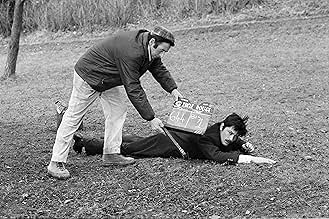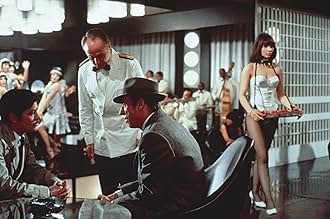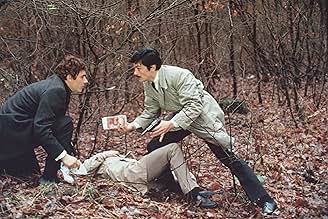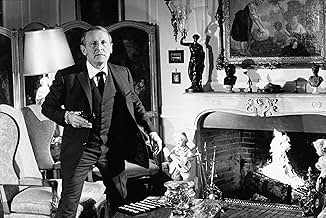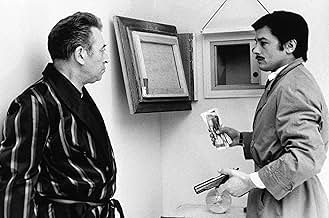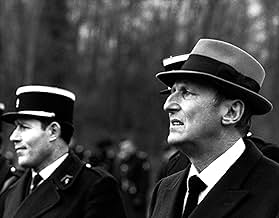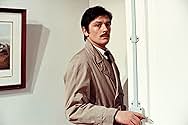VALUTAZIONE IMDb
7,9/10
30.637
LA TUA VALUTAZIONE
Dopo aver lasciato la prigione, il maestro ladro Corey incontra un famigerato evaso e un ex poliziotto alcolizzato. Il trio procede alla trama di un'elaborata rapina.Dopo aver lasciato la prigione, il maestro ladro Corey incontra un famigerato evaso e un ex poliziotto alcolizzato. Il trio procede alla trama di un'elaborata rapina.Dopo aver lasciato la prigione, il maestro ladro Corey incontra un famigerato evaso e un ex poliziotto alcolizzato. Il trio procede alla trama di un'elaborata rapina.
Bourvil
- Le Commissaire Francois Mattei
- (as André Bourvil)
Gian Maria Volontè
- Vogel
- (as Gian-Maria Volonte)
François Périer
- Santi
- (as François Perier)
Anna Douking
- L'ancienne amie de Corey
- (as Ana Douking)
Recensioni in evidenza
for the story. for acting. for music. and for the wise manner to define each character. after many films from same genre in the "60'-"70', Le Cercle Rouge cold seems be part of a series. but the work of a great director, a splendid cast - the performance of Bourvil is one of the great revelations -, the care for details and the shadows of personal stories as mixture of flavors are the virtues of a thriller who remains more than memorable. a film about few people as signs of theirs worlds. about duty. and about forms of madness. all - very simple. almost like drawings of a state of soul. a film about solitude.and a splendid atmosphere.short, a film who must see. maybe, only for the delicacy to expose delicate things who define each of us.
THE RED CIRCLE (Jean-Pierre Melville - France/Italy 1970).
This might be the coolest film ever made, in the most literal sense of the term. The men here never lose control and never - not once - show their emotions. No dramatic outbursts in this film. Everyone is cool all the time. It's an abstract dream-world, where the men live by their own code, a gangster code with the values of the outside world conspicuously absent. In this masterfully filmed heist saga, Melville tackles the American crime thriller in his distinctly dark and desolate style, yet made in grand fashion with a hefty budget of ten million dollars and with four of the greatest French stars at the time. Alain Delon as the master thief, Yves Montand as an alcoholic ex-cop, Italian star Gian-Maria Volonté as an escaped criminal and André Bourvil in an atypical role as the cynical police chief.
Melville described LE CERCLE ROUGE as his penultimate film and it is indeed a masterfully stylized policier. He also claimed he wanted to shoot a film noir in colour and in many ways he succeeded. The two primary influences for this film were John Huston's 1950 heist movie THE ASPHALT JUNGLE and Jules Dassin's RIFIFI (1955). But unlike these films, where we learn much about the background of the individual gang members, with all their petty needs and worries that motivate them, making clear these are not just ruthless underworld types, but ordinary individuals engaged in a world of everyday worries and human endeavour, Melville, though, tells us almost nothing about his criminals. Why was Corey (Alain Delon) in jail? Why was his associate, Vogel (Jean-Marie Volonté) arrested in the first place? Or why the ex-police marksman Jansen (Yves Montand) left the force, was it his alcoholism? We never learn the motivations behind their actions and never find out what drives these men. Women are even more absent than in his earlier films, with the "emotional" ties exclusively between men. They don't even seem to have personal lives. A sort of an emotional twilight zone and although the setting is not as abstract as in his earlier LE SAMOURAI (1967), Melville still sketches a very eerie world. Melville's favorite actor, Alain Delon, is perfect and almost outdoes himself in coolness, if imaginable.
Deliberately paced and with a length of over 140 minutes, Melville takes his time to tell the story, but its slow pace and length seems a perfect way to show the desolate world these men live in. Nothing is ever out of place in Melville's films and here it's no different, every little detail seemingly of pivotal importance for the story. Although LE SAMOURAI remains my favorite Melville film, even up there with the greatest films ever made, this one also belongs to the very best.
Camera Obscura --- 10/10
This might be the coolest film ever made, in the most literal sense of the term. The men here never lose control and never - not once - show their emotions. No dramatic outbursts in this film. Everyone is cool all the time. It's an abstract dream-world, where the men live by their own code, a gangster code with the values of the outside world conspicuously absent. In this masterfully filmed heist saga, Melville tackles the American crime thriller in his distinctly dark and desolate style, yet made in grand fashion with a hefty budget of ten million dollars and with four of the greatest French stars at the time. Alain Delon as the master thief, Yves Montand as an alcoholic ex-cop, Italian star Gian-Maria Volonté as an escaped criminal and André Bourvil in an atypical role as the cynical police chief.
Melville described LE CERCLE ROUGE as his penultimate film and it is indeed a masterfully stylized policier. He also claimed he wanted to shoot a film noir in colour and in many ways he succeeded. The two primary influences for this film were John Huston's 1950 heist movie THE ASPHALT JUNGLE and Jules Dassin's RIFIFI (1955). But unlike these films, where we learn much about the background of the individual gang members, with all their petty needs and worries that motivate them, making clear these are not just ruthless underworld types, but ordinary individuals engaged in a world of everyday worries and human endeavour, Melville, though, tells us almost nothing about his criminals. Why was Corey (Alain Delon) in jail? Why was his associate, Vogel (Jean-Marie Volonté) arrested in the first place? Or why the ex-police marksman Jansen (Yves Montand) left the force, was it his alcoholism? We never learn the motivations behind their actions and never find out what drives these men. Women are even more absent than in his earlier films, with the "emotional" ties exclusively between men. They don't even seem to have personal lives. A sort of an emotional twilight zone and although the setting is not as abstract as in his earlier LE SAMOURAI (1967), Melville still sketches a very eerie world. Melville's favorite actor, Alain Delon, is perfect and almost outdoes himself in coolness, if imaginable.
Deliberately paced and with a length of over 140 minutes, Melville takes his time to tell the story, but its slow pace and length seems a perfect way to show the desolate world these men live in. Nothing is ever out of place in Melville's films and here it's no different, every little detail seemingly of pivotal importance for the story. Although LE SAMOURAI remains my favorite Melville film, even up there with the greatest films ever made, this one also belongs to the very best.
Camera Obscura --- 10/10
On the eve of his release after five years imprisoned, the thief Corey (Alain Delon) is contacted by one guard of the prison that offers him a jewelry heist. However Corey seeks out his former boss Rico (André Ekyan) and steals money from him. Rico sends two gangsters to hunt Corey down and retrieve the stolen amount. Meanwhile the criminal Vogel (Gian- Maria Volonte) is transported by train by the Police Officer Mattei (André Bourvil) and succeeds to escape. Corey drives from Marseille to Paris and Vogel hides in the trunk of his car. Corey finds him but does not object to ride Vogel to Paris hidden in the trunk. When the gangsters sent by Rico cut in Corey's car, Vogel saves him from the criminals, but Corey loses the money. Without money, Corey decides to heist the jewelry with Vogel and invites the former police detective Jansen (Yves Montand) to team-up with them. The trio executes a perfect heist but Rico is seeking revenge and Mattei is an unethical but efficient police officer capable to use any means to resolve the case.
"Le cercle rouge" is another great heist movie by the French director Jean-Pierre Melville, one of the best in the genre crime and thriller. The thin line between the behavior of police members and criminals is impressively realistic. The scenes are very detailed and there are long sequences in absolute silence along 140 minutes running time but the movie is developed in an adequate pace and is never boring. The dream cast with Alain Delon, Gian-Maria Volonte and Yves Montand among others makes this movie totally believable. My vote is eight.
Title (Brazil): "O Circulo Vermelho" ("The Red Circle")
"Le cercle rouge" is another great heist movie by the French director Jean-Pierre Melville, one of the best in the genre crime and thriller. The thin line between the behavior of police members and criminals is impressively realistic. The scenes are very detailed and there are long sequences in absolute silence along 140 minutes running time but the movie is developed in an adequate pace and is never boring. The dream cast with Alain Delon, Gian-Maria Volonte and Yves Montand among others makes this movie totally believable. My vote is eight.
Title (Brazil): "O Circulo Vermelho" ("The Red Circle")
I saw this for the first time recently.
The film moves at a slow pace but doesn't get boring. The bleak photography along with the non dialogue heist n the final scene gives the film a very serious tone.
The muted heist is inspired by Rififi.
The camaraderie between the two convicts, especially when one of em says that we have seen worse gives u that ominous feel.
The requirement of a shooter in a heist n its reason will surprise viewers.
The dream sequence is one of the most creepy n claustrophobic one.
"Le Circle Rouge" from 1970 is a French film. That's another way of saying that a lot of Americans won't like it and won't understand this gritty and underplayed film. The title comes from a made-up Buddhist saying, "When men, even unknowingly, are to meet one day, whatever may befall each, whatever the diverging paths, on the said day, they will inevitably come together in the red circle." Melville made up a saying for Le Samourai as well.
One thing we've lost in filmmaking in this country is the art of the buildup. You have to get to the point of the story in five minutes. This film is about a jewelry heist, and the jewelry heist happens very late in the film.
Corey (Alain Delon) is released from prison after five years. Just before he leaves, one of the guards tells him about a jewelry heist he can get in on. Corey is uncertain, so instead he goes to his old boss Rico and steals money from him. Rico sends thugs after him to retrieve the money.
In a parallel plot, a criminal Vogel (Gian-Maria Volonte) is being transported by train and escapes. He winds up hiding in Corey's trunk while Corey is in a restaurant.
Corey finds him, hears his story, and lets him travel by trunk. The car is cut off by Rico's people, and in the ensuing fight, Corey loses the money. Now broke, he decides to join the jewelry heist and include Vogel.
They invite a former police detective, Jansen (Yves Montand) to join them. He is a bad alcoholic having the DTs. Somehow he manages to pull himself together and meet with them. The heist is on.
I would be surprised if there is one page of dialogue in this script, and yet you keep watching. Perhaps influenced by another classic, Rififi, the heist is carried out in complete silence.
The director, Melville, does a magnificent job of keeping us interested, even if there is not much background given of the characters. We know that Delon's boss is sleeping with his former girlfriend, and that's about it. We don't know what made Montand an alcoholic. Melville keeps us focused on their objective.
The acting is very smooth, with Volonte (Vogel) a standout who also has the best role. His scene of escaping police and dogs is one of the best scenes in the movie.
The police commissioner in the movie states that in the end, all men are guilty, even the police. He believes that we are all tainted with original sin. Maybe so. "Le Circle Rouge" won't do much to convince you otherwise.
One thing we've lost in filmmaking in this country is the art of the buildup. You have to get to the point of the story in five minutes. This film is about a jewelry heist, and the jewelry heist happens very late in the film.
Corey (Alain Delon) is released from prison after five years. Just before he leaves, one of the guards tells him about a jewelry heist he can get in on. Corey is uncertain, so instead he goes to his old boss Rico and steals money from him. Rico sends thugs after him to retrieve the money.
In a parallel plot, a criminal Vogel (Gian-Maria Volonte) is being transported by train and escapes. He winds up hiding in Corey's trunk while Corey is in a restaurant.
Corey finds him, hears his story, and lets him travel by trunk. The car is cut off by Rico's people, and in the ensuing fight, Corey loses the money. Now broke, he decides to join the jewelry heist and include Vogel.
They invite a former police detective, Jansen (Yves Montand) to join them. He is a bad alcoholic having the DTs. Somehow he manages to pull himself together and meet with them. The heist is on.
I would be surprised if there is one page of dialogue in this script, and yet you keep watching. Perhaps influenced by another classic, Rififi, the heist is carried out in complete silence.
The director, Melville, does a magnificent job of keeping us interested, even if there is not much background given of the characters. We know that Delon's boss is sleeping with his former girlfriend, and that's about it. We don't know what made Montand an alcoholic. Melville keeps us focused on their objective.
The acting is very smooth, with Volonte (Vogel) a standout who also has the best role. His scene of escaping police and dogs is one of the best scenes in the movie.
The police commissioner in the movie states that in the end, all men are guilty, even the police. He believes that we are all tainted with original sin. Maybe so. "Le Circle Rouge" won't do much to convince you otherwise.
Alain Delon's Top 10 Films, Ranked
Alain Delon's Top 10 Films, Ranked
To celebrate the life and career of Alain Delon, the actor often credited with starring in some of the greatest European films of the 1960s and '70s, we rounded up his top 10 movies, ranked by IMDb fan ratings.
Lo sapevi?
- QuizThe heist sequence lasts for exactly 27 minutes and features no dialogue at all.
- BlooperCorey's Plymouth has Marseille 13 plates in the showroom and halfway through the film. In Paris, the plates suddenly change to Paris 75 plates and after this, back to Marseille 13 plates.
- Citazioni
Le chef de la police: All men are guilty. They're born innocent, but it doesn't last.
- Curiosità sui creditiThe movie's Opening Credits include an epigraph: "Siddhartha Gautama, the Buddha, drew a circle with a piece of red chalk and said: 'When men, even unknowingly, are to meet one day, whatever may befall each, whatever the diverging paths, on the said day, they will inevitably come together in the red circle.'" This quote explains the title of the film.
- Versioni alternativeAn alternate, 83-minute English-language version also exists, wherein most of the lead performers delivered their lines in (generally phonetic) English. This version was released to Korean home video under the title "Circle It In Red", although the actual onscreen title of the print reads "The Red Circle".
- ConnessioniFeatured in Nel nome di Melville (2008)
I più visti
Accedi per valutare e creare un elenco di titoli salvati per ottenere consigli personalizzati
- How long is Le cercle rouge?Powered by Alexa
Dettagli
- Data di uscita
- Paesi di origine
- Lingua
- Celebre anche come
- Le Cercle Rouge
- Luoghi delle riprese
- Place du Panthéon, Paris 5, Parigi, Francia(arrest of Santi's son)
- Aziende produttrici
- Vedi altri crediti dell’azienda su IMDbPro
Botteghino
- Lordo Stati Uniti e Canada
- 432.820 USD
- Fine settimana di apertura Stati Uniti e Canada
- 14.843 USD
- 12 gen 2003
- Lordo in tutto il mondo
- 473.897 USD
Contribuisci a questa pagina
Suggerisci una modifica o aggiungi i contenuti mancanti

![Guarda Bande-annonce [OV]](https://m.media-amazon.com/images/M/MV5BMjJmZTZkZjctODI5My00ZmI3LWE4ZjYtMTUxMjQ0NmUzMTZmXkEyXkFqcGdeQXRyYW5zY29kZS13b3JrZmxvdw@@._V1_QL75_UX500_CR0)

